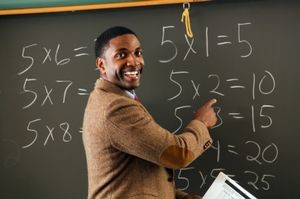
The fact that there is a crisis in South African education is not new. An objective outsider would agree that the weight of available evidence favours the judgment that our education system is in dire straits.
Whether one uses local or international assessments, the picture that emerges is that thousands of schools are academically bankrupt, with practically no learning taking place during the year.
Some may protest that such statements are too harsh, but even a cursory analysis of the data suggests otherwise. For example, in the 2012 National School Effectiveness Study, Grade 5 pupils were shown a picture of three grocery items with three prices attached to them and asked: "How much will these items cost altogether?" The prices were R5.10, R4.20 and R1.30.
Even though this is a Grade 2-level question, 70% of pupils at no-fee schools - in other words, excluding Model C and private schools - were unable to answer it correctly.
So, after at least 500 hours of scheduled mathematics instruction, most Grade 5 students still did not have basic fluency in arithmetic, a finding verified by a number of other assessments.
How is it possible that the majority of Grade 5 pupils are operating at a Grade 2 level?
An increasingly popular response to that question in academic circles is that too many primary school maths teachers have low levels of content knowledge themselves. And teachers cannot teach what they do not know.
A 2007 study by the Southern and Eastern Africa Consortium for Monitoring Educational Quality tested a nationally representative sample of Grade 6 pupils and a sample of 401 Grade 6 maths teachers in South Africa. Only 46% of the teachers could answer one of the multiple-choice questions correctly, and in the Eastern Cape only 30% of them could give the right answer.
This is only marginally above what teachers would have got if they had just guessed because they would have got it right 25% of the time on a four-choice question.
Unsurprisingly, only 22% of the Grade 6scould answer correctly - equivalent to random guessing.
Another question was: "To mix a certain colour of paint, Enni combines five litres of red paint, two litres of blue paint and two litres of yellow paint. What is the ratio of red paint to the total amount of paint? a) 5:2; b) 5:4; c) 5:9; d) 9:4." The correct answer is "c".
This question is well within the Grade 6 maths curriculum, yet only a third of the South African Grade 6 maths teachers could answer it correctly - again only slightly better than guessing. In contrast, 82% of Kenyan Grade 6 maths teachers and 64% of Tanzanian Grade 6 maths teachers could answer it correctly.
In fact, given that this question was asked in a 1995 assessment by the Trends in International Mathematics and Science Study (Timss), we know how Grade 8 students from around the world performed on this question. Whereas an astonishingly low 16% of South African Grade 8 pupils could answer this question correctly, 87% of Korean Grade 8s and 95% of Singapore's Grade 8 pupils got it right. So the average 14-year-old child in Singapore or Korea would perform better on this item than the average Grade 6 maths teacher in South Africa.
In fact, of the 16 questions that were common to the 2007 Grade 6 maths teacher test by the Southern and Eastern Africa consortium and the Grade 8 Timss test of 1995, South African teachers scored only 30% correct after adjusting for guessing. The figure for Kenyan Grade 6 maths teachers is 72%, and 71% for Singaporean Grade 8 pupils - both also adjusted for guessing.
Unsurprisingly, an international report on the Africa consortium study states that only 32% of Grade 6 maths teachers in South Africa had desirable subject knowledge. This is in stark contrast to results in Kenya (90%), Zimbabwe (76%) and Swaziland (55%).
The situation is also highly variable by province: Mpumalanga had almost no maths teachers with desirable content knowledge - only around 4%. In the Eastern Cape, it is 17%, Gauteng 41% and Western Cape 64%. Yet the report written by the South African Department of Basic Education for the consortium monitoring educational quality does not discuss these very low levels of maths content knowledge. It is unclear why the department has not already identified this as a major priority and taken action. The evidence base is large, consistent and unambiguous.
Many of these teachers should not be blamed for this situation: they are the victims of inadequate apartheid-era training and ineffective post-apartheid in-service teacher training.
Post-apartheid in-service teacher training has not worked because there is too little transfer from training to classroom practice. Unless training influences teaching and learning in the classroom, there is little reason to believe it should increase student learning.
Teachers in academically bankrupt schools need to be tested to identify content knowledge gaps and then given high-quality training and support that has been proven to work.
It is one of the scandals of higher education that after almost two decades of democracy, our education faculties have not managed to create an in-service training programme that has been rigorously evaluated and proven to raise teacher content knowledge, which is a necessary, but by no means sufficient, condition for improving student learning. Teachers also need to be able to convey that knowledge.
Nevertheless, it is widely accepted that teachers need a thorough mastery of the mathematics several grades beyond that which they are expected to teach.
The longer it takes to give teachers high-quality training, the longer the children in their care will remain illiterate and innumerate. When maths teachers have such low levels of content knowledge, should we really be surprised when there is virtually no learning taking place in these schools?
Image by: Gallo Images/Thinkstock
By: Nic Spaull
Spaull is a researcher with the economics department of Stellenbosch University
http://www.timeslive.co.za/opinion/2013/08/22/it-s-the-teachers-lack-of-subject-knowledge-stupid
Article Source: Times Live
